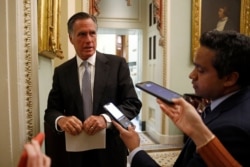Clare Egan is an American athlete who qualified for the 2022 U.S. Olympic Team. She competes in the biathalon, a sport that combines the winter survival skills of cross-country skiing with target shooting.
As chair of the International Biathlon Union’s (IBU) athletes’ committee, Egan opposes calls for an international boycott of the 2022 Winter Olympics in China. She believes Team USA athletes should be allowed to participate in the games so China’s alleged record of genocide and human rights abuses of its Uyghur citizens, a Muslim minority, will be spotlighted during the events scheduled for February 4-20.
“It's really important for everyone involved in the Olympics to not overlook [the alleged abuses] and not let the grandeur of the Olympics cover that up,” Egan told VOA Mandarin this month in a Skype interview, calling the games an opportunity to help anyone suffering human rights violations.
“It can’t be on the athlete to be forced to not do your job and not participate in the Olympics in order for your country to be able to promote a particular policy,” she said. “But I do think it is the responsibility of the [International Olympic Committee] to put pressure on host countries to comply with the Olympic charter, and human rights are front and center in the Olympic charter.”
Promotion of peace
The charter, which calls the practice of sports “a human right,” places “sport in the service of the harmonious development of humankind, with a view to promoting a peaceful society concerned with the preservation of human dignity.”
The charter also declares the IOC a politically neutral organization.
Egan’s opposition to a boycott is counter to that of a global array of rights groups and politicians who believe a boycott would pressure China to address alleged human rights abuses.
Among them is Mike Pompeo, former U.S. secretary of state. During an event earlier this month, he said, “I don’t think we should have any American go and participate in the ‘Genocide Olympics.’ ’’ Forty-nine percent of Americans agree with Pompeo, but 46% oppose the boycott, according to a March poll by the Chicago Council on Global Affairs.
No countries have officially declared a boycott.
On April 7, the U.S. State Department denied that a boycott was under consideration after a post-briefing tweet the day before by spokesperson Ned Price.
China’s state-controlled Global Times recently called boycott discussions “an unnecessary distraction for athletes who are preparing for the games.”
'Radical calls'
“The radical calls are also causing burden on global businesses, which could result in heavy economic losses,” said the April 7 editorial. “Olympic sponsors, including Coca-Cola, Visa, General Electric and other multinational corporations, which count on the Winter Olympics to gain greater market share in the massive Chinese market, are now caught in the crossfire.”
IOC President Thomas Bach said at a press conference last month that “we are taking this very seriously,” adding that the IOC is not equipped to solve all the world’s problems.
Egan disagrees with the IOC's attitude saying, “It's just absolutely ridiculous for them to pretend that maybe they need to stay out of politics when the IOC awards these events which bring in billions of dollars and put the host country and host community up on a pedestal.”
The quadrennial international games draw vast audiences. In 2018, 1.92 billion people — or 28% of the world's population — watched the Winter Olympic Games in South Korea, held February 9-25, according to organizers.
“No one is asking [the IOC] to solve the problem, only to notice it and do no more than they are able,” wrote Ben Lowsen, a China adviser for the U.S. Air Force, in The Diplomat, a current-affairs magazine that covers the Asia-Pacific region.
“Remaining silent aids the abuser, so standing still is not an option," he wrote. "The world at large cannot expect the IOC to address every issue, but the issue of genocide is too great to ignore.”
No need for 'pawns'
But Egan said, “I think there's a lot of other mechanisms that the United States or any country has access to for promoting its ideals and promoting its policies that do not involve using athletes as political pawns.”
Republican Senator Mitt Romney, who helped organize the 2002 Olympic Winter Games in Salt Lake City, Utah, has called for an economic and diplomatic boycott to coincide with the games.
"American spectators — other than families of our athletes and coaches — should stay at home, preventing us from contributing to the enormous revenues the Chinese Communist Party will raise from hotels, meals and tickets," he wrote in The New York Times, adding that American corporations, which "routinely send large groups of their customers and associates to the games," could reroute them to U.S. venues instead.
"Rather than send the traditional delegation of diplomats and White House officials to Beijing, the president should invite Chinese dissidents, religious leaders and ethnic minorities to represent us," he wrote, adding that broadcasters such as NBC, "which has already done important work to reveal the reality of the Chinese Communist Party's repression and brutality ... can refrain from showing any jingoistic elements of the opening and closing ceremonies and instead broadcast documented reports of China's abuses."
Although world events such as the pandemic have caused cancellations of the Olympics, utilization of the games as a platform to advance human rights has a long and storied history.
The U.S. last prohibited athletes from attending the games in 1980, when, along with 66 other countries, it boycotted the Moscow Games over the Soviet Union's invasion of Afghanistan.
“I know someone personally who missed the 1980 Olympics in Moscow because of that boycott,” said Egan. “And I thought that we have kind of learned our lesson from that, which was that it's not effective and it's definitely not fair to use young athletes as political pawns in that way.”
Adrianna Zhang contributed to this report.








